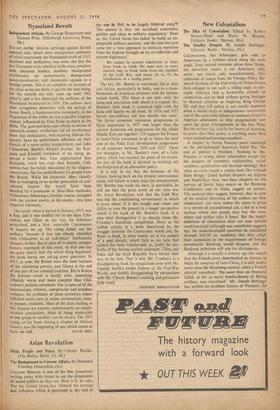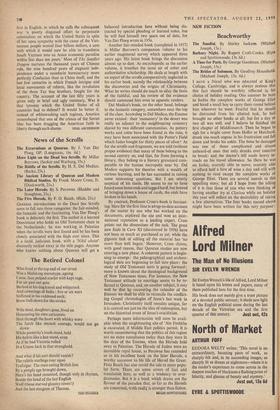New Colonialism
The Idea of Colonialism. Edited by Robert Strausz-Hupd and Harry W. Hazard. (Atlantic Books : Stevens, 42s.) The Smaller Dragon, By Joseph Buttinger. (Atlantic Books : Stevens, 45s.)
COLONIALISM, like Schweppes, gets sold to Americans by a ruthless attack along the snob angle. Your natural reticence about these things, the advertiser sneers, is not American, only naive: not moral, only unsophisticated. This collection of essays from the Foreign Policy Re- search Institute of the University of Pennsylvania feels obliged to use such a selling angle to per- suade America that a favourable attitude to colonialism can be held without giving hostages to Marxist criticism or forgiving King George III, and that US policy is not merely impotent when it smiles shyly at independence movements and at the same time refuses to condemn France's Algerian obsessions as they progressively tear apart the great arrangements of the free West. But the writers fail, luckily for lovers of America, to prove that their policy is anything more than a tear-stained and passing expedient.
A chapter by Stefan Possony pours contempt on the old-fashioned American belief that 'the end of politics is freedom.' Nothing to Mr. Possony is wrong about colonialism except for the dangers of economic exploitation, racial snobbery, paternalism and decrepit ideology. But what on earth would a colony look like without these things? Good factual chapters on Algeria and South-East Asia, two duty chapters on the horrors of Soviet Asia, essays on the Bandung Conference and on India, suggest no answer. The material does suggest, however, that in spite of the wishful theorising of the authors no 'new colonialism' can exist unless the name is given to a torrent of unconditional aid, a bid in a mad auction where two people may buy the same object and neither take it liome. But the book's definition of colonialism does not even include conditional aid (although one contributor suggests that the underdeveloped countries be subsidised through NATO on condition that they adapt their economies to the requirements of foreign investment). Bandung would disagree, and the Bandung definition will win the dictionaries.
Although it is exactly a century ago this month that the French army disembarked in Annam to begin the conquest of Indo-China, it is only twelve years since the Haiphong reprisal, when a French admiral remarked : 'No more than six thousand killed, as far as naval bombardment of fleeing civilians was concerned.' Mr. Joseph Buttinget has written an excellent history of Vietnam, the
first in English, in which he calls the subsequent war `a poorly disguised effort to perpetuate colonialism on which the United States in spite of her open sympathy with the cause of the Viet- namese people wasted four billion dollars, a sum with which it would now be able to transform South Vietnam into an Asian economic paradise within less than ten years.' Most of The Smaller Dragon narrates the thousand years of Chinese rule, the nine hundred years of stagnant inde- pendence under a mandarin bureaucracy more perfectly Confucian than in China itself, and the last few centuries in which French intrigue and local movements of reform, like the revolution of the three Tay Son brothers, fought for the country. The account of the last fifty years is given only in brief and ugly summary. Was it that tyranny which the United States of all countries had to defend? It would be better if, instead of whitewashing such regimes, America remembered that one of the crimes of the Soviet bloc has been dragging the American faith in































 Previous page
Previous page